Widening Participation



The Glasgow School of Art (GSA) is the only independent art school in Scotland. Our main campus is based in the heart of Glasgow City Centre and students come from all over the world to study with us.
We offer undergraduate degree programmes in the following subjects:
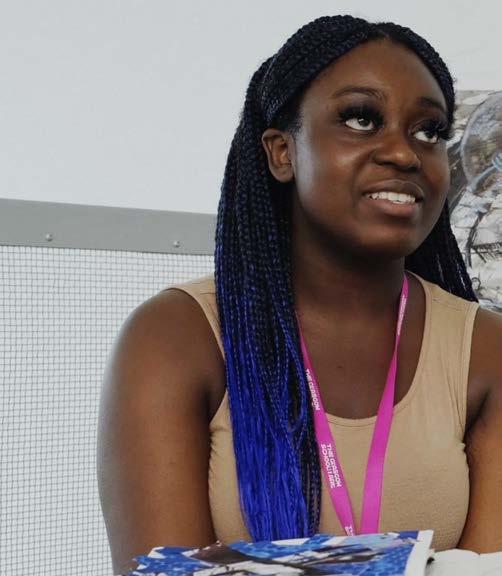
– Architecture
– Communication Design
– Design for Health and Wellbeing
– Engineering with Architecture1
– Fashion Design
– Fine Art Photography
– Games and Virtual Reality
– Interaction Design
– Interior Design
– Painting & Printmaking
–
–
–
Product Design
Product Design Engineering2
Sculpture & Environmental Art
– Silversmithing & Jewellery Design
– Sound for the Moving Image3
–
Textile Design
– 3D Modelling
Our undergraduate degrees are studiobased and practice-led, meaning that our students spend most of their time making work relevant to their subject (e.g., drawings, models, samples, prototypes). Students' practical work is enhanced by learning about relevant history and theory, helping them go on to be successful and employable graduates. More information about our undergraduate degrees is available at gsa.ac.uk/study/
All GSA degrees are validated by the University of Glasgow.
1 Run jointly with the University of Glasgow.
2 Run jointly with the University of Glasgow.
3 Applicants need to have completed a relevant HND or equivalent at college first.
It’s important for those wishing to go to art school to research the different degrees on offer to find out which are best suited to them based on their interests, aptitudes and future career ambitions. There are a number of ways young people can learn more about what studying at the GSA is like.
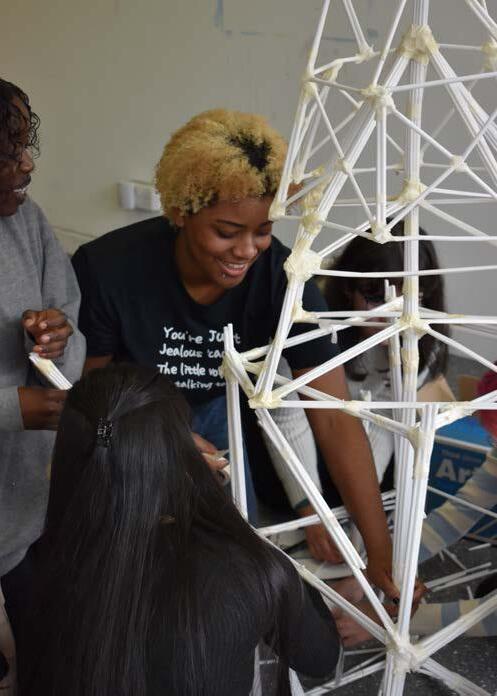

Pupils might meet GSA staff at their school careers event or local UCAS exhibition. Our helpful and friendly team will be happy to answer any questions young people have about the different undergraduate degrees they can study at the GSA and how to apply.
IMAGES: Top: Still from 'Widening Participation Stories: Elizabeth' Bottom: S5 Portfolio Course on-campus
The GSA offers a wide range of OPEN events throughout the year to help you get the right information and support at the right time, including Open House Days, Pre-Applicant Advice sessions, student-led campus tours and one to one virtual sessions to support you at every step of the application process.
Open House events take place in autumn and spring and are a chance to visit the GSA campus to meet our staff and students, see the studios and workshops, attend a range of talks and ask questions about what you can expect from studying at the GSA.

For details of what's coming up and how to register, scan the QR code below.
 IMAGES: Left: Installation view, Anna Jack, Transitions into GSA Studio Week
IMAGES: Left: Installation view, Anna Jack, Transitions into GSA Studio Week

The GSA Degree Show is a large-scale exhibition of final year students’ work which is open to the public and attracts thousands of visitors every year. Seeing student work can help prospective applicants decide which degrees they might want to study.

The GSA Degree Show will be open to the public from Friday 2 June – Sunday 11 June 2023.
For opening hours, visit gsashowcase.net
The exhibition is accompanied by the online exhibition at gsashowcase.net
The Glasgow School of Art delivers a Widening Participation programme for eligible young people who are underrepresented at the GSA.
The goal of the GSA Widening Participation programme is to help eligible young people build a strong portfolio for application to art school or college, and to support them into the next step of their educational journey. Eligible pupils can join the Widening Participation programme any time between S4 and S6. Widening Participation courses have on campus and online study options available. All activities are free of charge and take place as far as possible in the evening, at weekends and during school holidays, so they don’t clash with the school timetable.
The programme is open to S4-S6 pupils from state secondary schools across Scotland who meet one or more of following criteria:
– live in a priority postcode area
– are care experienced
– are a young carer
– are estranged from their parents or legal guardians
– are a refugee or seeking asylum in the UK
– are a young Black person or young Person of Colour (BPOC)
– live in a very rural or island community across Scotland
– are eligible for FOCUS West support
Supporting evidence may be requested to verify eligibility.
IMAGES: Top: Student sketchbooks
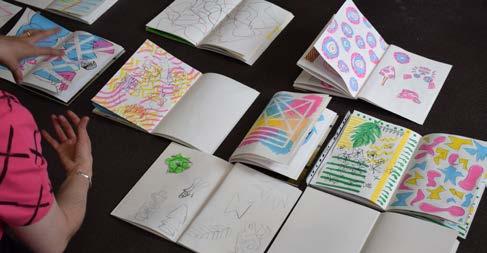
Left: Ink drawing by Anna Salohub, Architecture Portfolio Course online
Right: Architects in the Making

Live in a priority postcode area
Care experience
The Scottish Index of Multiple Deprivation (SIMD) classifies postcode into one of five groups called 'quintiles'. Priority postcode areas are those which are quintile 1 and 2.
Young people who have been looked after by a local authority for any length of time, including adoption, foster care, residential or secure care, formal kinship care or looked after at home with support from social work.
Young carer
Estranged from parents or legal guardians
Young carers are those who care for someone, who due to illness, disability, mental health issues, or an addiction, cannot cope without their support.
Young people who are studying without the support of their parents or legal guardians through an irreconcilable breakdown in relationships or through being disowned. Young people in this position often have no verbal or written contact at all with both of their parents or legal guardians for a significant period of time and this would be very unlikely to change.

Someone who is forced out of their country to escape war, indiscriminate violence or persecution. A person who is seeking asylum has also fled their country for their own safety but is still awaiting the outcome of their application to be recognised as having refugee status by the Government.
Someone who identifies as belonging to a racial or ethnic group that is not white or has experienced discrimination based on their ethnicity or race.
The Urban Rural Classification assigns postcodes into one of eight categories to provide a consistent definition of urban and rural areas across Scotland. Most very rural and island areas have postcodes which are a 7 or 8. FOCUS West See www.focuswest.org.uk
Widening Participation activities help young people learn more about the different creative courses they can study at college and university, and support them to build a portfolio of work to apply. We offer on-campus and online study options to help young people do this.

Our on-campus courses take place in a GSA studio, providing the opportunity to become familiar with an art school learning environment. Participants make work in response to creative briefs with guidance from a tutor and GSA student mentor, surrounded by other young people interested in applying to art school. A wide range of art materials are available to use in the studio.
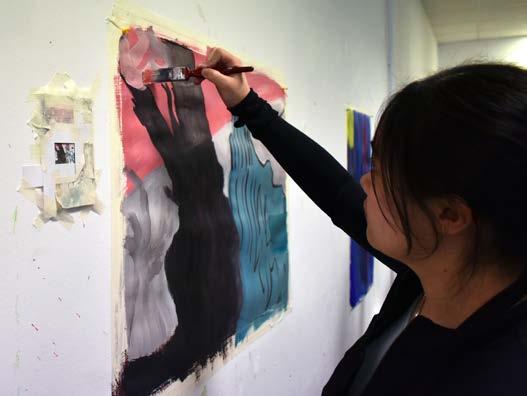
“It was great to be able to use a studio environment, it was inspiring to be surrounded by other creative people in a creative space.”
“All of the tutors were very helpful and encouraging which made me feel there were no mistakes only ‘happy accidents’ to learn from and that these are a normal part of the creative process.”
The online courses we offer take place live on Microsoft Teams, led by a tutor and GSA student mentor. Participants are guided through a range of creative activities and share images of their work in progress to receive feedback from their tutor and classmates during the session. Art materials are posted to pupils in advance and are free of charge. These courses can be accessed using a laptop, tablet or mobile device with an internet connection.

IMAGES: Top: S5 Portfolio Course online
Left: S5 Portfolio Course on campus.
Right: Painting by Xu Qingxuan, S6 Portfolio on campus

“I liked being on camera and being able to see everyone else working at the same time as me, it was motivating! Hearing other people talk about their work made me feel excited to talk about mine.”
“I learned about so many methods and materials that I would never have thought to use.”
We have created an engaging programme of courses, workshops and events to inspire the young people we work with.

IMAGE: Mary Taylor presenting their work at group crit during Transitions into GSA Studio Week.
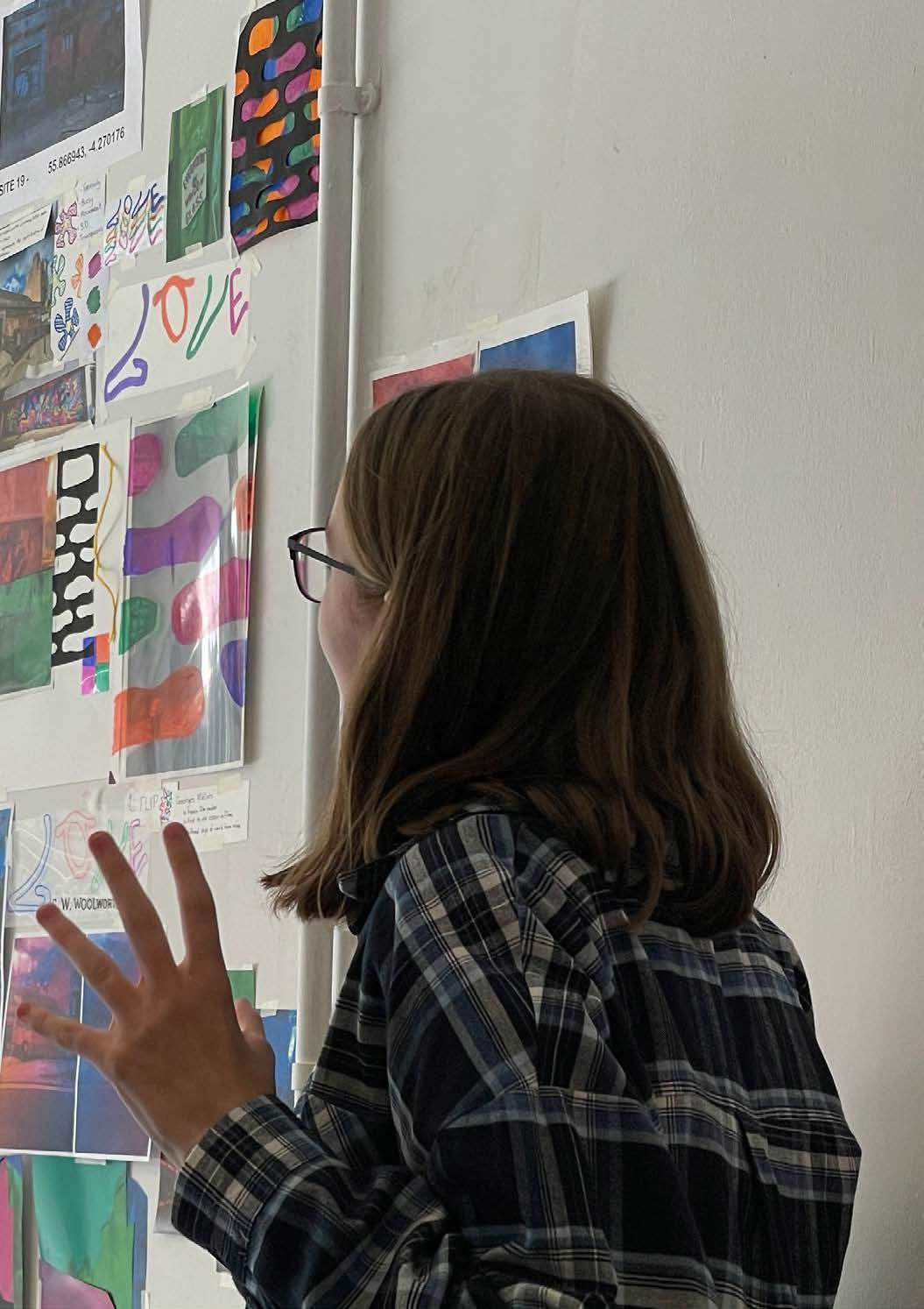
On-campus
– Wednesdays, 5pm – 8pm, 6 September – 24 January 2024
– Thursdays, 5pm – 8pm,
7 September – 25 January 2024
– Sundays, 2pm – 5pm,
10 September – 28 January 2024
Online
– Thursdays, 5pm – 8pm:
–
7 September – 25 January 2024
Saturdays, 10am – 1pm:
9 September – 27 January 2024
The S6 Portfolio Course runs for 18 weeks and is open to eligible S6 pupils who plan to submit a UCAS application to study a creative undergraduate degree starting in September 2024. The course includes a number of creative projects that will help participants to generate high quality, relevant work suitable for their portfolio. The course builds a variety of key skills, with a focus on developing creative process, using research to enhance practical work and building confidence for self-directed study. Participants are encouraged to experiment with a wide range of materials (provided free of charge) and will gain experience of study methods at the GSA including peer learning, tutorials, group critique and independent projects.
100% of participants last year said they received useful feedback about how to develop their work.
“My tutor and student mentor were incredibly helpful. They made me feel so welcome and gave me genuine advice that helped so much, they have been tremendous.”
“I feel much less stressed about my portfolio and applications now, I wish it could have gone on for more weeks as it went by so fast!”
“The group crit was the best part for me as I got an insight on other people’s work and processes as well as my own.”
Architecture Portfolio Course (10 weeks)
On-campus
– Mondays, 5pm – 8pm, 9 October – 18 December 20234
– Saturdays, 2pm – 5pm, 14 October – 16 December 2023
Online – Wednesdays, 5pm – 8pm, 11 October – 13 December 2023
This is a 10-week course for eligible pupils in S5 or S6 who are interested in studying architecture when they leave secondary school. The course is designed to give pupils the knowledge and skills needed to compile a strong portfolio of work specifically for architecture courses. Key skills covered include orthographic drawing, model making and using research to inform project outcomes. Participants are encouraged to develop an active interest in architecture by looking closely at the built environment around them and researching precedents of internationally important contemporary architecture.
100% of last year’s participants said they felt more confident about their applications to college or university as a result of taking part.
4 GSA is closed for mid-semester break on Monday 6 November 2023 so no class will take place on this date. The course will resume the following week.
“Great course, very well thought out and taught by an inspiring tutor and student mentor!”
“This course was extremely helpful in showing what kind of work is good for an architectural portfolio.”
“I’ve always been interested in architecture, but the WP programme gave me a real fire for what I was keen on pursuing.”
– Saturday 27 January 2024, 10am – 3pm
A one-day, on-campus workshop for eligible applicants to Architecture at the GSA. Participants will work with Architecture staff and students to learn more about the architecture programme and produce relevant 2D and 3D work to enhance their portfolio.
–
Monday 18 September 2023
– Monday 02 October 2023
– Monday 16 October 2023
– Monday 30 October 2023
– Monday 13 November 2023
– Monday 27 November 2023
– Monday 11 December 2023
A drop-in fortnightly film club for S5 and S6 pupils taking place on Microsoft Teams, 5pm - 6pm. The videos shown will introduce participants to a diverse range of contemporary creative practitioners, help them develop good secondary research skills and give them a space to practice talking about art,
and
in preparation for potential future interviews.
design
architecture
“It was good being able to express my opinion on the work presented and find out if other peoples were similar or different from mines.”
“It was great having an actual architect as the tutor!”
“The best aspect of the workshop was the studio environment and being able to talk through my ideas with everyone.”
On-campus
– Block 1: Sundays, 10am – 1pm
10 September – 12 November 2023
– Block 3: Sundays, 1pm – 4pm
11 February – 14 April 2024
Online
– Block 2: Tuesdays, 5pm – 8pm
12 September – 14 November 2023
– Block 4: Tuesdays, 5pm – 8pm
13 February – 16 April 2024
A course for eligible S5 pupils who are interested in studying a visual creative subject at art school or college. This runs for 10 weeks and participants will take part in a number of short creative projects including an introduction to sketchbooks, experimental drawing and working in 3D. The course culminates in a group crit where pupils display all their coursework and discuss their strengths and areas for development. Many pupils who complete this course include the work they produce in their portfolio.
IMAGE: Series of Paintings by Aimee Elliot, S5 Portfolio Course online.

“I got to try out new materials and techniques and started realising what degree courses I might be interested in.”
“My tutor just radiated positivity which was very motivating and uplifting!”
“This course showed me that I can produce good work in a short time, and that it’s okay if it’s not perfect.”
On-campus
– Summer: 10 – 14 July 2023, 10am – 3pm daily
– Spring: 8 – 12 April 2024, 10am – 3pm daily
These courses are the perfect opportunity for eligible S4 pupils to find out if studying a visual creative course is right for them. Young people join us on the GSA campus for five days to take part in a range of creative activities in one of our studios. A visit to a gallery or museum is built in to every S4 Taster Week to help participants learn more about contemporary art, design and architecture. It’s a great chance for young people to make new friends from other schools and meet professionals currently working in the creative sector.
Online
– Saturday 26 August 2023
– Saturday 30 September 2023
– Saturday 28 October 2023
– Saturday 25 November 2023
– Saturday 27 January 2024
– Saturday 24 February 2024
– Saturday 30 Ma rch 2024
A series of live online workshops taking place on the last Saturday of every month, 11am - 1pm. Participants learn how to make interesting creative work with a new art material, posted to them for free before each session. Tutors provide guided demonstrations of each activity, and pupils share photos of their work to receive feedback during each session. S4 pupils can attend as many workshops as they like, subject to successfully booking a place before each one.
We work with our friends from across the creative sector in Scotland to offer additional special events. Eligible pupils should register with the Widening Participation programme as soon as possible to receive information about these.
“I learned how to be more creative and expressive in my artwork.”
“I wish it was longer because it was fun!”
“The S4 Taster Weeks helped me get a better idea of the differences between Fine Art, Design and Architecture courses and what I am good at.”
The Widening Participation team provide impartial information and advice to eligible pupils for every stage of the application process to the GSA.
Applicants to the GSA need to submit a digital portfolio and accompanying statement. These are scored by GSA staff to determine if the applicant progresses to the next stage of the process. The Widening Participation team offers eligible applicants support in compiling their digital portfolio, including advice on selection of images and how best to lay them out.
Most GSA programmes interview applicants to learn more about the work in their portfolio and establish their readiness for undergraduate level study.
A small number of programmes do not require an interview, see gsa.ac.uk for more information. All eligible applicants are invited to the Widening Participation Interview Support Workshop, an online event providing comprehensive information, advice and guidance about how to best prepare for an interview at the GSA.
Eligible applicants who are shortlisted for interview at the GSA are invited to attend a mock interview with the Widening Participation team. This provides a chance to practice talking through the digital portfolio and answering the types of questions that could be asked during the real interview.
100% of those who had a mock interview in 2023 said their performance at their real interview was better for it.
“The mock interview took the mystery away from how the real interview would be.”
“Getting feedback on presenting my portfolio, tips on things to mention and how to organise my thoughts/notes was really useful and helped alleviate some of my anxiety prior to the actual interview.”
Applicants living in Scotland who face circumstances that may prevent them from meeting the GSA’s standard academic entry requirements are encouraged to apply if they meet our adjusted academic entry requirements. This includes applicants who live in a priority postcode area, have official refugee status or answer ‘Yes’ in response to the following questions in their UCAS application:
– Have you been in care?
– Would you consider yourself estranged from your parents (i.e., you’re not in contact with and supported by your parents)
– Do you have any caring responsibilities?
– Are you currently receiving free school meals?
The adjusted entry requirements for the GSA are as follows:
Architecture
Scottish Highers at BBCC at Higher level to include a literate subject plus Maths or Physics.
Fine Art programmes 5
Scottish Highers at BBCC at Higher level to include a literate subject.
Design programmes 6
Scottish Highers at BBCC at Higher level to include a literate subject.
Innovation programmes 7
Scottish Highers at BBCC at Higher level to include a literate subject.
3D Modelling
Scottish Highers at BBCC at Higher level to include a literate subject.
Games and Virtual Reality
Scottish Highers at BBCC at Higher level to include a literate subject plus Maths.
5 Fine Art Photography, Painting & Printmaking, Sculpture & Environmental Art
6 Communication Design, Fashion Design, Interaction Design, Interior Design, Silversmithing & Jewellery Design, Textile Design
7 Product Design and Design for Health & Wellbeing
Literate subjects include: English, Business Management, Classical Studies, Economics, ESOL, Geography, History, Media Studies, Modern Studies, Philosophy, Politics, Psychology, Religious Studies, and Sociology.
Information correct at time of printing (May 2023). Please see www.gsa.ac.uk for the most up to date information.
Eligible applicants who receive an offer from the GSA can benefit from Transitions into GSA activities before starting their undergraduate degree. These activities help incoming first year students to progress to university level study and start their degree at the GSA with confidence.
TRANSITIONS INTO GSA IS DELIVERED IN THREE PARTS:
GSA Student Q&A session
May –Online
Degree Show Tour
June –
On-Campus
Studio Week
September –
On-Campus
Participants will hear current GSA students talk about their journey from secondary school to art school and can ask any questions they have about preparing for and starting their undergraduate studies.
Young people will meet other incoming first year students and receive a guided tour of the GSA Degree Show.
Students take part in a five-day practical studio course and gain experience of key aspects of studio-based learning at the GSA such as working to a self-directed brief, incorporating research into practical work, peer-learning, one to one tutorials and group critique. Studio week can also help participants to build connections and friendships with other first year students from different degree programmes across the GSA before induction begins the following week. All materials are provided free of charge.
Scan the QR code below to watch some of our 'Widening Participation Stories'.

“I learned how to explore different ideas and develop my work more thoroughly, exploring as many different creative routes as possible.”

